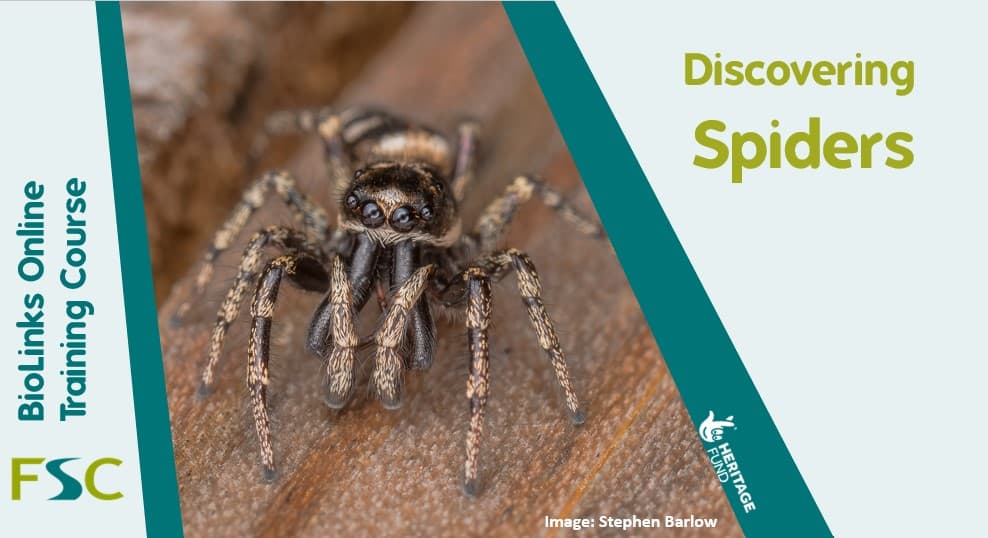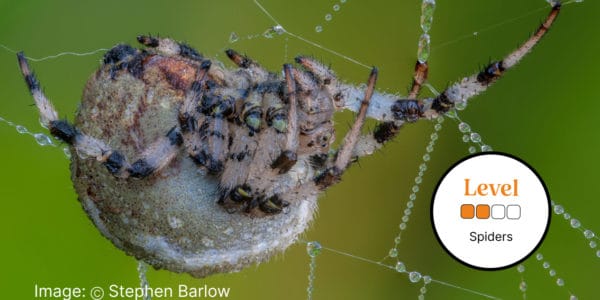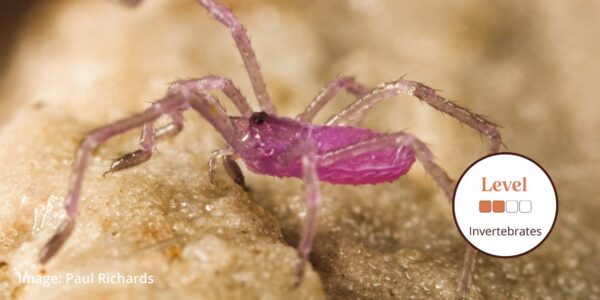There are an estimated 43,000 species of spider found worldwide with over 650 found in Britain alone – despite this they are often overlooked and under-recorded as a group.
This course aims to introduce learners to the general body plan of a spider, their ecological roles within ecosystems and discusses the wild array types of webs our UK species can produce. We also delve into how spiders have influenced human cultures and technology globally before getting out and finding some examples of UK spider species.
If you’re interested in finding out more about spiders but don’t feel ready for a beginner’s ID workshop, then this is the course for you. Discovering spiders is a very gentle introduction to some of our planets most misunderstood invertebrate groups, introducing aspects of their biology and ecology and aims to give learners the skills and confidence before delving into species Identification.
- 4-week online course for adults, with a weekly time commitment of 3-5 hours per week.
- Access to study content, activities and tutor-graded assignments through the FSC virtual learning platform.
- Access to weekly live virtual classroom sessions at the end of each week with the course tutor through Zoom (recorded for those that are unable to attend the live sessions).
- E-certificate upon course completion.
- Learners will benefit from having access to a 10X hand lens to get the most out of this course.
- Please note that this course is NOT a species identification course.
- Please email [email protected] if you have any questions.
This course is aimed at adults only and course attendees must be at least 18 years old in order to attend.
What topics are covered in this course?
- ARA101: Spider Biology In the first week’s content, we introduce spiders as a taxonomic group and how they differ from other invertebrate groups. By the end of this section, learners should be able to identify the main body parts of a spider and their functions. Learners will also look at a spider’s generalised lifecycles and their roles within the ecosystems.
- ARA102: Spider Silk and Spider Webs In the second weeks content learners look at the types, structure and uses of spider web.
- ARA103: Spider Behaviour and Attitudes to Spiders In the third week’s content, we have a look at the types of behaviour exhibited by spiders including the various styles of hunting exhibited by different groups of spiders. Learners will also be able to identify different forms of mating behaviours and ways in which spiders disperse from their hatching site.
We also look at human attitudes to spiders, we explore the roots of fear and why spiders are so often feared by others. Learners will be shown examples of media coverage on spiders and look at the facts behind those reports. Learners will also be shown some examples of how spiders are represented across different human cultures historically on a global scale. - ARA104: Finding SpidersIn the final week of taught content learners start to bring together the knowledge gained in the last three weeks to help them locate spiders. Learners will look at types of spider habitats, look at basic collection methods and develop the skills needed to collect and handle spider specimens without harming them. Learners will also begin to learn and practice the formation of observations in order to start to build the foundations for the formation of basic identification skills. This topic ends with the last of our practical assignments, to find and make observations of a live spider specimen.
Course fees
Regular Price: £60 For professionals and residents outside of the UK. Select ‘Attendee (Online)’
Subsidised Price: £20 Subsidised by the FSC BioLinks project for non-professionals eg. volunteers, biological recorders, wildlife gardeners, amateur naturalists and students.Available to UK residents only. Select ‘Attendee Discounted (Online)’
Tutor: Lawrence Bee
Working in the natural environment, Lawrence Bee has developed a varied experience as an all-round field naturalist through extensive practical, hands-on work in the field of ecology and nature conservation. His particular interests include spiders, ancient trees and oak woodland, moths and plant galls. He is the co-author of the FSC foldout chart ‘Spiders of the house and garden’ and of the recently published WILDGuide ‘Britain’s Spiders’.Live virtual classroom session dates and times
The webinars will take place every Tuesday for the duration of the course:
- Week 1: Tuesday 10/05/2022 ,7:00pm - 7:45pm
- Week 2: Tuesday 17/05/2022, 7:00pm - 7:45pm
- Week 3: Tuesday 24/05/2022 ,7:00pm - 7:45pm
- Week 4: Tuesday 31/05/2022 ,7:00pm - 7:45pm
The live webinars will be recorded for those that cannot make the session.
Example Timetable
Week 1: Spider Biology
- Self-study material: available from 03/05/2022
- Assignments due: 7:00 pm on 08/05/2022
- Week 1 live webinar: 10/05/2022 (at 7:00pm)
Week 2: Spider Behaviour and Attitudes to Spiders
- Self-study material: available from 7:00 10/05/2022
- Assignments due: 7:00 pm on 15/05/2022
- Week 2 live webinar: 17/05/2022 (at 7:00 pm)
Week 3: Spider Silk and Spider Webs
- Self-study material: available from 7:00 pm 17/05/2022
- Assignments due: 7:00 pm on 22/05/2022
- Week 3 live webinar: 24/05/2022 (at 7:00pm)
Week 4: Finding Spiders
- Self-study material: available from 24/05/2022 (at 7:00pm)
- Assignments due: 7:00pm on 29/05/2022
- Week 4 live webinar: 31/05/2022 (at 7:00pm)
The final deadline to complete any outstanding assignments and self-study components is 07/06/2022.
What's Included
- Access to study content, activities and tutor-graded assignments through the FSC virtual learning platform.
- Access to weekly live virtual classroom sessions at the end of each week with the course tutor through Zoom (recorded for those that are unable to attend the live sessions).
- E-certificate upon course completion.
Bursaries and Subsidies
FSC BioLinks
FSC BioLinks is an exciting project for FSC in the South East and West Midlands, bringing together existing volunteers with skills in biological recording and identification, and new volunteers.
This project provides subsidised training courses, learning opportunities and digital tools focussed on invertebrate identification for anyone involved or interested in biological recording, to build and strengthen the community.
Invertebrates provide us with many useful ecosystem services, like pollination and decomposition, which we cannot survive without but their numbers are declining. Few people know how to identify or record invertebrates meaning there is a lack of data
We are delighted to have been awarded a grant of £1.23 million from the National Lottery Heritage Fund for this project.
Before You Attend
Once you've signed up to the course you'll receive an e-mail with access to the virtual learning platform (Moodle) a week before the first webinar.
Log on as soon as you can to familiarise yourself with the platform and course materials, and be sure to complete the first activities before the first webinar.
Webinars are delivered through Zoom, so you don't need to download any additional software to attend - just click the link just before the meeting is due to start and it will open in your web browser.
Learners will benefit from having access to a 10X hand lens to get the most out of this course.
Sorry this course has ended



